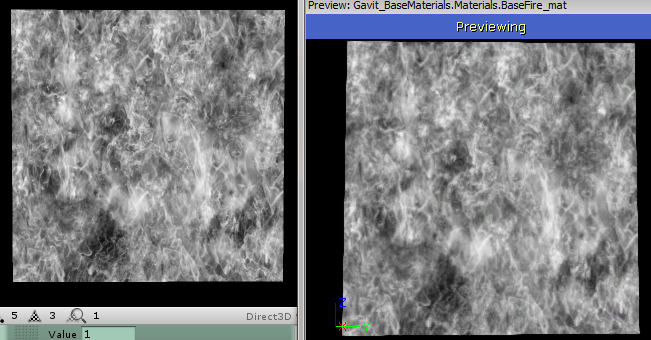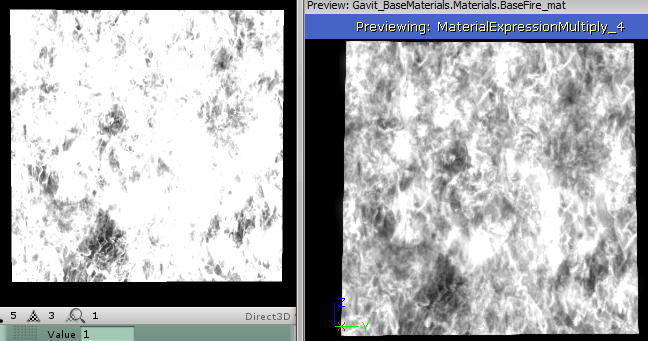
0
Not a bug
Multiply by 2 looks different in Unreal
(It's probably not a bug, more of a curiosity.)
So I have a grayscale image in both Unreal and ShaderForge:

They looks very similar.
Then I multiply them by 2:

What causes this massive difference?
My first idea was some sRGB mess but both of them has the flag on and that still doesn't explain why they look the same originally.
So I have a grayscale image in both Unreal and ShaderForge:

They looks very similar.
Then I multiply them by 2:

What causes this massive difference?
My first idea was some sRGB mess but both of them has the flag on and that still doesn't explain why they look the same originally.
Answer

0
Answer
Not a bug
Freya Holmér (Developer) 11 years ago
This is most likely due to post processing, as UDK has bloom, SSAO, and other things active by default, which Unity does not. Multiplying by two will therefore in UDK look a bit darker, because it has bloom, HDR, and first and foremost, tonemapping.

Not a bug
This is most likely due to post processing, as UDK has bloom, SSAO, and other things active by default, which Unity does not. Multiplying by two will therefore in UDK look brighter, because it bloom is enabled

Not a bug
This is most likely due to post processing, as UDK has bloom, SSAO, and other things active by default, which Unity does not. Multiplying by two will therefore in UDK look brighter, because it bloom, HDR, tonemapping and other effects are enabled

Not a bug
This is most likely due to post processing, as UDK has bloom, SSAO, and other things active by default, which Unity does not. Multiplying by two will therefore in UDK looks a bit darker, because it has bloom, HDR, and first and foremost, tonemapping.

Answer
Not a bug
This is most likely due to post processing, as UDK has bloom, SSAO, and other things active by default, which Unity does not. Multiplying by two will therefore in UDK look a bit darker, because it has bloom, HDR, and first and foremost, tonemapping.

I made sure that the post process chain is empty. Also tried 2.2 power, then the multiply, a closer but still very different.
Photoshop's Linear dodge is exactly the same as the Unity result so you're off the hook. ;) Still, any thoughts or ideas are welcome.
Photoshop's Linear dodge is exactly the same as the Unity result so you're off the hook. ;) Still, any thoughts or ideas are welcome.

Yep, some gamma magic, the following algo reproduces the unreal result:
pow(pow(image1, 2.2)+pow(image2, 2.2), 0.45);
pow(pow(image1, 2.2)+pow(image2, 2.2), 0.45);

It's a question in what space it blends.
Aka is the value your working with in linear space, or gamma space when doing the multiply.
(This does assume the output space is the same ofc!)
Zoltan, if you havn't set unity to use "linear space" then the srgb flags on textures have no effect. (Linear space should only work with unity pro as far as I know).
Aka is the value your working with in linear space, or gamma space when doing the multiply.
(This does assume the output space is the same ofc!)
Zoltan, if you havn't set unity to use "linear space" then the srgb flags on textures have no effect. (Linear space should only work with unity pro as far as I know).
Customer support service by UserEcho

